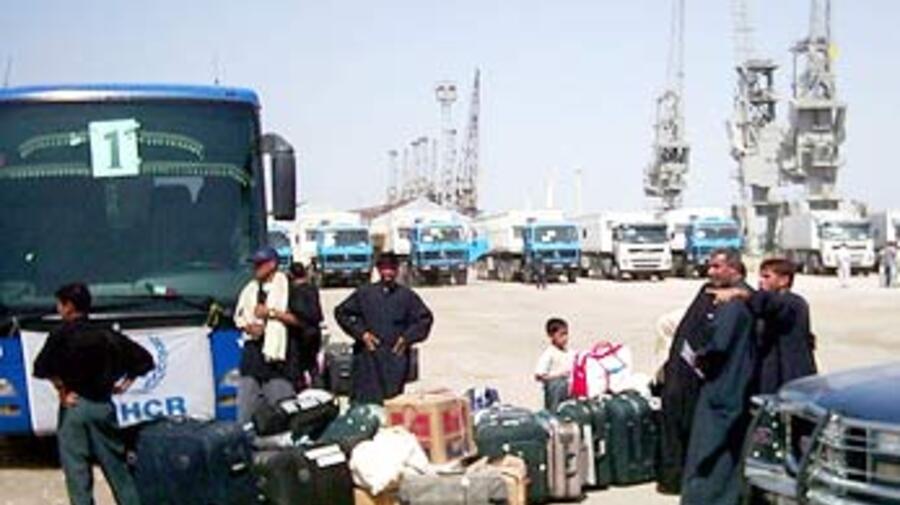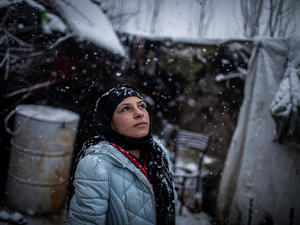UNHCR delays return convoy to Iraq amid insecurity
UNHCR delays return convoy to Iraq amid insecurity

Iraqi returnees unloading their luggage in the southern Iraqi city of Basra after years of exile in Saudi Arabia.
BASRA, Iraq, April 6 (UNHCR) - Recent clashes in southern Iraq have prompted the UN refugee agency to interrupt its regular return convoys from Iran, and affected assistance by UNHCR partners on the ground.
According to reports from Basra in southern Iraq, local drivers are refusing to transport people beyond Basra city out of fear of illegal checkpoints along the roads, hijackings and other security issues. This means that recent Iraqi returnees cannot go back to their home areas and have to be accommodated at the UNHCR transit centre in Basra.
To prevent overcrowding at the transit centre, UNHCR on Tuesday briefly delayed a return convoy of 209 Iraqi refugees from Shiraz in Iran. The group later received exceptional clearance from the refugee agency to cross into Iraq, but Wednesday's planned convoy has been suspended temporarily.
In an earlier convoy from Iran on Monday, the majority of the 495 returnees managed to find onward transportation to their areas of origin, but 25 destined for Al Amara and Maysan governorates were left stranded at the Basra transit centre.
"UNHCR does not promote return to Iraq, but only facilitates the repatriation of those refugees eager to go back," stressed UNHCR spokesman Peter Kessler at a Geneva news briefing on Tuesday.
The agency has repeatedly raised concerns about insecurity in Iraq and the lack of resources - physical, economic, social and humanitarian - to support mass returns. It started facilitating returns last July because large numbers of Iraqi refugees insisted on going back despite landmine risks at the border and the general instability back home.
Some 10,000 Iraqi refugees have gone back from Iran, Saudi Arabia and Lebanon with UNHCR-facilitated repatriation convoys since last July. An estimated 120,000 others - possibly more - have returned spontaneously to the south, mainly from Iran.
UNHCR has been unable to monitor the returns since pulling out its international staff from Iraq following last August's attack on the UN headquarters in Baghdad. It relies on non-governmental organisations (NGOs) on the ground to deliver assistance to the returning refugees. This includes distributing relief items to vulnerable returnees like the elderly and women-headed households; as well as rehabilitation and income-generating projects in areas of return.
However, the fragile security situation has made work difficult for the few UNHCR partners that remain in the country. "Despite the enormous humanitarian needs, agencies are increasingly working to keep their profiles as discreet as possible," said Kessler. "This is seriously affecting the amounts of assistance that can be provided to returnees, non-Iraqi refugees and displaced persons living in the area."
The situation has been exacerbated by recent floods caused by the seasonal melting of snow in the north. As a result, thousands of people have been displaced in the three southern governorates of Al Muthanna, Dhi-Qar and Maysin. UNHCR has provided funds to strengthen dikes to prevent further flooding. Security conditions permitting, the agency's partners have undertaken assessment missions and plan to send tents, blankets, mattresses and soap to help up to 300 displaced families in Maysin governorate in the coming days.
"We're encouraging local officials to locate the temporary tented settlements away from potential flood-affected areas to avoid the possibility of illnesses brought on by the flooding," said Kessler. "We're also working through partners to ensure that tents are set up with relatives or host families to avoid establishing camp-like situations and the need to establish additional sanitation, water and food distribution networks."






